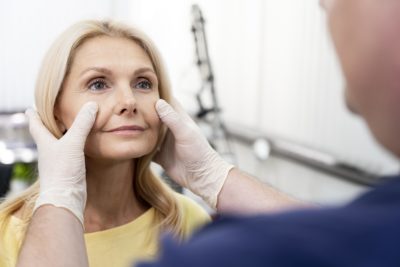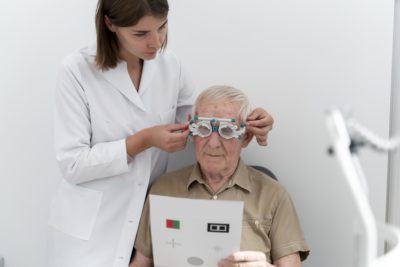Are you experiencing tears, itchiness, and redness in your eyes? If yes, you must seek medical attention from eye care doctors as these signs and symptoms may indicate pterygium. If left untreated, this condition worsens, leading to double or blurry vision and increased size of the lesion.
Pterygium is a condition which refers to the growth of a pinkish, triangular tissue over the cornea, the clear front surface of the eye. This condition is typically not sight-threatening, but it can cause discomfort and visual disturbances, prompting you to visit your eye care specialists. It can occur from either side of your eyes, but it is usually observed at the side close to your nose.
To mitigate the symptoms, doctors may recommend surgery that we will cover in this blog.
Treatment Options for Pterygium
The approach to pterygium medical treatment depends on the severity of the condition, the symptoms it causes, and your preferences. Here are the main treatment options:
-
Pterygium Treatment Eye Drops
Lubricating and anti-inflammatory eye drops can provide relief from symptoms like redness, itching, and irritation associated with pterygium. While they can help manage the condition, eye drops alone are unlikely to eliminate the growth or address the concerns.
For inflamed pterygium treatment, eye doctors may prescribe steroid eye drops, but it isn’t a cure. This is why surgery is required for pterygium eye treatment.
-
Surgery for Pterygium
Surgical removal of the pterygium, known as Pterygium excision, is often recommended when the growth of pterygium becomes visually significant, threatens vision, or causes persistent discomfort. This outpatient procedure involves removing the pterygium and replacing it with healthy conjunctival tissue to reduce the chances of recurrence. You can visit professional doctors for pterygium eye treatment.
-
Topical Medications
In some cases, eye drops containing corticosteroids or other medications may be prescribed for pterygium medical treatment. Doctors may prescribe it before or after surgery to reduce inflammation and prevent recurrence.
Risk of Surgical Pterygium Eye Treatment
Since pterygium treatment eye drops can’t eliminate pterygium, specialists perform surgery, which involves complications if not done:
- Pterygium may occur again after the removal of pterygium. To prevent pterygium regrowth, it is essential to adhere to the prescribed steroid drops and shield the eye from sun exposure.
- Formation of a cyst or the occurrence of an infection.
- Persistent double vision may necessitate further surgical intervention.
- The possibility of ongoing dryness or irritation in the eye.
- Scleral or corneal melting – severe damage affecting these two layers of the eye. While this is rare but it is treatable if attended early
The Right Time to Call Your Doctor
When the fleshy growth is visible in your eyes, and you experience vision difficulty, call or visit your doctor immediately. If you have undergone surgery for pterygium eye treatment and you experience the recurrence of the symptoms, it’s time that you call your doctor. You must schedule regular follow-ups to check the recovery of your surgery.
If you experience pterygium symptoms, pterygium treatment eye drops can be a temporary cure. Using doctor-recommended eye drops may provide relief from symptoms and help to keep the eye comfortable. However, they are not a standalone solution for eliminating the need for surgery in cases where the pterygium is causing visual disturbances, affecting vision, or causing significant discomfort.
Consult your eye care specialist even if you feel minor problems in your eyes. Our doctors at Dr Agarwal’s Eye Hospital assess the severity of your condition, discuss your symptoms and concerns, and recommend the best pterygium medical treatment. Whether you ultimately require surgery or find relief through the use of pterygium treatment eye drops, seeking professional guidance is crucial in managing pterygium effectively and preserving your eye health.
For inflamed pterygium treatment, book your appointment with Dr Agarwals Eye Hospital today!








